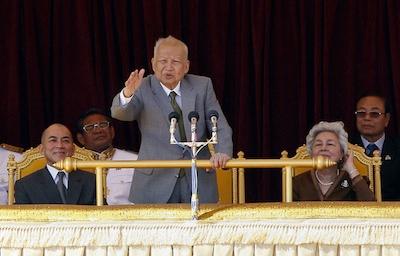Former King Sihanouk is dead. What’s next for Cambodia’s monarchy?
Cambodia’s deceased former king, Norodom Sihanouk (C), speaks at the Royal Palace in Phnom Penh on October 30, 2011 as Cambodia marks the 20th anniversary of Sihanouk’s return to the country from exile.
It is impossible to succinctly sum up the life of Norodom Sihanouk, the former king of Cambodia who observed his poor, violence-scarred country transform many times since his birth in 1922.
According to the BBC and many other outlets, Sihanouk has died in a Beijing hospital. If there is one takeaway from Sihanouk's life, it is that he largely achieved his life goal: keeping the Khmer monarchy intact. Considering that the institution weathered colonialist forces, the brutal Khmer Rouge years and Vietnamese invasion, this was no simple feat.
Acheiving this goal brought on several humiliating circumstances, most notably his decision to ally with the horrific Khmer Rouge regime that brought about nearly two million deaths. The king (then a prince) did not get on well with Pol Pot, the communist faction's reclusive leader.
According to a Pol Pot biographer, Philip Short, the tyrant called Sihanouk as "an old, meek tiger, all skin and bones and no claws or fangs" He was confined to his palace, a "golden cage" where no outsiders were allowed but where Sihanouk was "amply provided for." According to Short, he "grumbled about running out of rum to make bananes flambées" all while "hundreds of thousands of his compatriots were dying of starvation."
Now that the Cambodian monarch has lost its great defender, it's future is uncertain.
Sihanouk's son, the current King Norodom Sihamoni, presides over an institution that is far less relevant or powerful than it was in his father's heyday. And his contemporary life offers parallels to his father's years spent in a golden cage. (That's him in the necktie sitting to his father's left in this photo.)
Sihamoni is unmarried and unlikely to father an heir. As I wrote last year in a piece on homosexuality in Cambodia, "gay Cambodians note with a wink that the king is a style-conscious bachelor and former ballet instructor in Paris. His mother has explained diplomatically that her son 'loves women as his sisters' and is not expected to marry." (That said, a royal council is permitted to choose a successor even in the absence of an heir.)
Furthermore, Sihamoni has become something of a "prisoner in his own palace," according to an Associated Press report, which asserts that he is "surrounded by the government's watchdogs."
Today, power in Cambodia emanates from its ruling political cabal, not from the throne. While Sihanouk died with his revered palace intact, he left behind an institution that is limping along.
